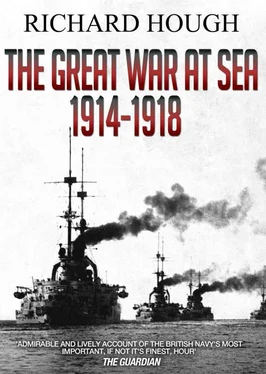The public and private argument that shook the nation early in 1909, leading up to the presentation to Parliament of the naval estimates, was whether four or as many as six new dreadnoughts should be provided for. The radical-Liberal element led by Lloyd George and Winston Churchill (then at the Board of Trade) stated emphatically that the nation could afford only four new ships if the Liberal welfare commitments were to be met, and that the Admiralty was being alarmist in asking for more.
The Conservatives, the conservative Press, and big-navy members of the Liberal Cabinet, however, kept up a sustained campaign for a minimum of six. There were threats of resignations inside the Cabinet and the Admiralty, and the whole country rapidly became involved with passions running high among extreme ‘patriots’ or ‘panic mongers’ and the ‘pacifists’ or ‘little Englanders’. Lloyd George came in for much abuse. The feeling at Buckingham Palace can be judged by referring to a letter the King’s private secretary wrote to Lord Esher about Churchill: ‘What are Winston’s reasons for acting as he does in this matter?’ he asked. ‘Of course it cannot be from conviction or principle. The very idea of his having either is enough to make anyone laugh.’ (7)
In the end the violent storm abated and the arguments were settled by the wily and ingenious Prime Minister, Herbert Asquith. He proposed to his split and outraged Cabinet that there should be provision for the construction of four dreadnoughts in the 1909-10 financial year, and a further four later if they were deemed essential. In the event, they were wanted, of course; for within months anxiety about German intentions had become even more widespread.
It was left to Churchill to make the comment: ‘In the end a curious and characteristic solution was reached. The Admiralty had demanded six ships: the economists offered four: and we finally compromised on eight. (8)
This ‘compromise’ had been reached as much because of news from the Mediterranean as from Germany. On the night of Easter Sunday 1909 a special messenger arrived at the Admiralty from the Prime Minister. Asquith had just learned that Austria, no doubt under pressure from her ally, Germany, was to build three or four dreadnoughts and he wished to know what information Fisher had on this dramatic news. Fisher rapidly learned that this was indeed true, and moreover that Italy, as alarmed as Britain, was about to put in hand her own dreadnought building programme. The anti-navalist view was that the two programmes cancelled each other out as far as Britain’s security in the Mediterranean was concerned. The Prime Minister, the Board of Admiralty, and a majority in the Cabinet remained anxious and unconvinced, and the ‘contingent’ dreadnoughts were authorized. The ships provided for, including the ‘contingent’ ships, were the battleships Colossus and Hercules , four ships of the Orion class, and the battle-cruisers Lion and Princess Royal . All but the first two mounted 13.5-inch guns at Fisher’s insistence. The Germans had nothing larger than 12-inch guns until 1916.
Fisher’s supporters regarded this unprecedented programme as his culminating triumph. His enemies at home did not see it in this light, and conveniently forgot the fact, five years later when war broke out, that only the four extra ‘contingent’ dreadnoughts gave the Royal Navy its dangerously slim margin of strength over the High Seas Fleet. Instead, these enemies concentrated their considerable forces, which included the Prince of Wales, on ousting Fisher before he could (as they believed) damage the Navy fatally.
The Beresford pack of hounds, those excluded from the ‘Fishpond’ as they saw themselves, motivated by spite and jealousy, scarred from being passed over or slighted, were relentless in the pursuit of their quarry, and used the most unscrupulous methods, and their wealth and influence with the Press and Society.
The burden of their argument was that Fisher, by his neglect and starvation of the Navy and refusal to stand up to the politicians, had brought the service to the brink of disaster and all but destroyed its superiority and magnificence, and the esteem in which the world held it no more than five years ago.
The closed world of the Navy which occupies so much of its time on shipboard has always suffered from gossip and backbiting. Resentments and divisiveness build up all too readily in wardrooms, where unusual behaviour and ‘braininess’ were discouraged and class divisions were accentuated. The same could be said of London Society.
Given that Beresford was nearly mad by 1909, his proposed toast to celebrate the day he succeeded in driving Fisher from office is not an exaggeration of the language he used in his struggle against the First Sea Lord: ‘To the death of Fraud, Espionage, Intimidation, Corruption, Tyranny, Self-Interest…’
A leader of 20 March 1909 is no less typical of the passions expressed in Fleet Street by the ultra-conservative, anti-Fisher Press: ‘The sole responsibility for the fact that in a few months Great Britain will be in a more vulnerable position than she has been since the Battle of Trafalgar belongs to the First Sea Lord… We arraign Sir John Fisher at the bar of public opinion, and with the imminent possibility of national disaster before the country we say again to him, “Thou art the man!"’ (9)
Beresford, seen by the vast mass of the uninformed as the ultimate patriot, was cheered at Portsmouth as a national hero when he was obliged to haul down his flag prematurely in March 1909. He at once went into battle in a final attempt to topple his enemy. The nation was in a highly emotional state over the Navy and the threat from Germany. ‘We want eight and we won’t wait!’ sounded up and down the land at public meetings as the people cried out for more dreadnoughts.
It was difficult for a politician to ignore a sailor like Beresford with such influential as well as wide popular support. Asquith listened to his complaints, and to the outrage of the Board and Fisher’s supporters, agreed to set up a committee to investigate the charges made by Beresford about the conduct of naval affairs.
This occurred during the behind-the-scenes fight by Fisher and the Board to increase above four the proposed dreadnought programme. Fisher was in despair and threatened to resign. First Esher, and then the King (who contrary to his eldest son admired and supported Fisher) begged him to remain in office. The King’s letter put new steel into the First Sea Lord. ‘I’m not going till I’m kicked out!’ he wrote, and characteristically underlined every word.
The committee of four cabinet ministers with the Prime Minister in the chair held fifteen meetings and filled nearly 600 pages with their proceedings and appendices. The main charges against the Board concerned the organization and distribution of the fleets in home waters, the deficiency in small craft due to the concentration on dreadnoughts, and the inadequacy of war plans.
Fisher and the Board were cleared of all charges, but with one or two provisos which suggested that Asquith, while avoiding a bland conclusion, did not want to be too hard on either admiral. The main criticism was of the lack of trust and cordial relations between Beresford and Fisher, which hardly caused surprise. But there was also a hint that a Naval War Staff with a brief to prepare war plans should by this time have been established.
Beresford and his supporters persuaded themselves that they had won, and were publicly jubilant, the newspapers and magazines hostile to Fisher renewing their attacks with a lack of restraint unusual even for that time. There was, the National Review claimed, ‘no end to the catalogue of his high crimes and misdemeanours’. And ‘Should it come to hanging, [Fisher] will be entitled to the nearest lamp-post.’ Fisher’s supporters were equally certain they had won. But Fisher himself still outraged that the committee had even been formed, also resented in a typically over-sensitive manner the shadow of censure in the report. Weary and disgusted, disregarding even the King’s congratulations, he determined to resign.
Читать дальше












